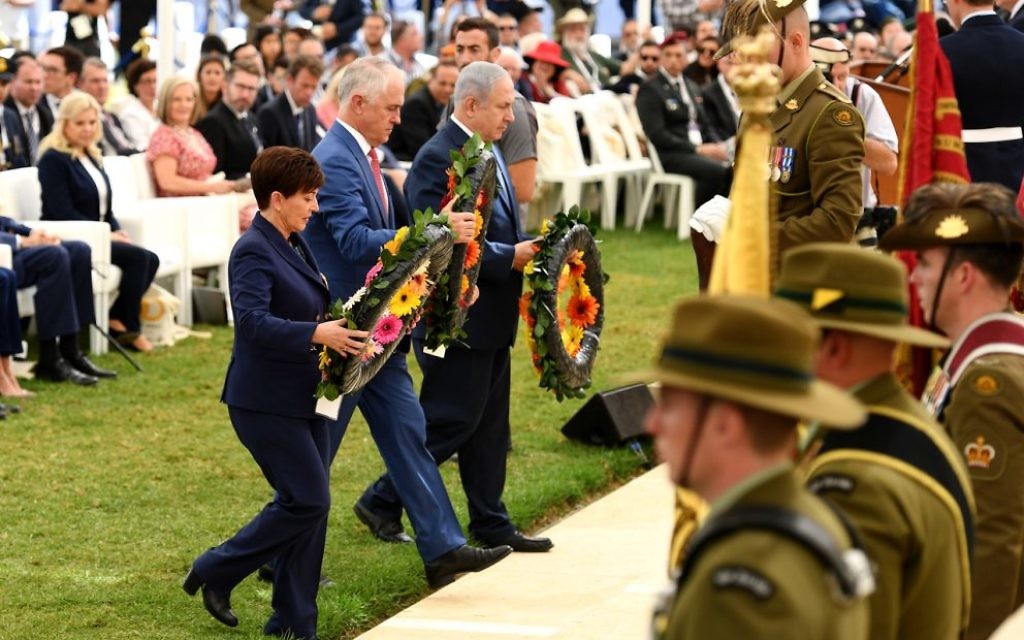Shoulder to shoulder remembering our fallen heroes
'We each lower our flags to half-mast and dedicate a national day to reminding Australians and Israelis that our democratic rights and freedoms have, and continue to be, secured'.

ISRAEL and Australia share a historic and enduring commitment to honour the sacrifice of those brave few who risked their lives in the defence of — and freedom for — their fellow citizens.
Every year on April 25, Australia commemorates and honours its servicemen and women on Anzac Day.
Similarly, every year in April-May, Israel stands still to commemorate its fallen soldiers for Yom Hazikaron on the eve of Israel’s Independence Day.
We each lower our flags to half-mast and dedicate a national day to reminding Australians and Israelis that our democratic rights and freedoms have, and continue to be, secured by those who lay their lives on the line for the sake of their nations and our values.
The special bond between Australia and Israel was forged in the fires of World War I and World War II, and continues today. Beginning in the famous Battle of Beersheba on October 31, 1917, this important victory by the Australian Light Horse Brigade was not only a decisive turning point in the campaign against the Turks, but also a forging moment for Australia as a nation and arguably its first big achievement on the world stage.
The city of Beersheba stands together with Australia on #AnzacDay to commemorate and honour the brave ANZAC soldiers who took part in the daring charge of the city in 1917. ???????????????? ???? Beersheba Municipality
Posted by The Australian Jewish News on Saturday, April 24, 2021
In this mounted charge of Beersheba, 31 Anzacs lost their lives. Among them was Trooper Albert “Tibby” Cotter, a great Australian fast bowler and Test cricketer who volunteered to the Australian Imperial Force in 1915. He died in the Battle of Beersheba while bravely serving as a stretcher bearer, and now rests in Israel in the Beersheba Anzac War Cemetery.
In many ways Cotter embodies the mateship and blood bond between Australia and Israel. This sense of camaraderie found its expression in the word “cobber”, a term coined in the trenches which in fact derives from the Yiddish word “chaber”, meaning friend.
The Anzacs made their presence known through their bravery in the eastern Mediterranean during World War I. Diggers — Aussies and Kiwis — fought side-by-side with the British, Americans and even a small Jewish contingent against the Ottoman army in Gallipoli. They went on to fight against the Turks in Palestine and, following the Battle of Beersheba, would eventually march into Jerusalem and join the British victory together with General Edmund Allenby.
In 1941, Anzac troops returned to the Middle East to join the allies’ fight against Nazi Germany. Again, the Anzac tradition of bravery, sacrifice, resilience and ingenuity presented itself in the battles of Tobruk and El-Alamein, fending off German invasion into Palestine and preventing the Holocaust from reaching its shores. Both of these incredible efforts in the two world wars culminated in an important contribution to the future establishment of the Jewish State of Israel.
One of Australia’s most famous Anzacs, General Sir John Monash, is a towering symbol of the special connection between our two peoples.
This great Australian of Jewish faith led part of the allied forces to victory on the Western Front in August 1918, cementing his reputation as one of the war’s outstanding commanders.
Monash was also instrumental in promoting the importance of creating a Jewish state and the maintenance of Jewish identity, becoming the first president of the Zionist Federation of Australia and New Zealand in 1927. The deep respect of Israelis for Monash is evidenced by the town of Kfar Monash in central Israel, named in his honour. This sense of kinship and true friendship between Australia and Israel and between our two peoples has continued through the 21st century.
On the occasion of the centenary of the Battle of Beersheba in 2017, former Australian prime minister Malcolm Turnbull, together with New Zealand’s Governor-General Patsy Reddy and Israeli Prime Minister Benjamin Netanyahu inaugurated the Beersheba Anzac War Museum built beside the existing Anzac War cemetery.
The State of Israel not only remembers its thousands of fallen sons and daughters killed since 1948 in the struggle for independence and survival, but also does not forget its great friends who stood by and supported us during this long journey.
Thus Australia has earned our great admiration for its sacrifice and its fervent and continuous support of Israel.
This year, I had the honour of participating in the Anzac Day service at the Australian War Memorial in Canberra, as just days ago we at the embassy of Israel commemorated our “Anzac Day” on the eve of Israel’s 73rd Independence Day.
On Sunday, we stood together shoulder to shoulder with our cobbers and mates, the people of Israel with the people of Australia, to salute Australia’s heroes.
Lest We Forget.
Jonathan Peled is Israel’s interim ambassador to Australia.
Get The AJN Newsletter by email and never miss our top stories Free Sign Up

comments